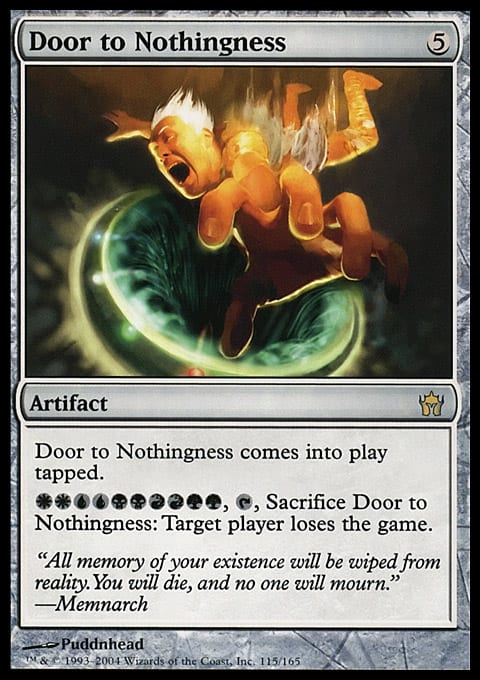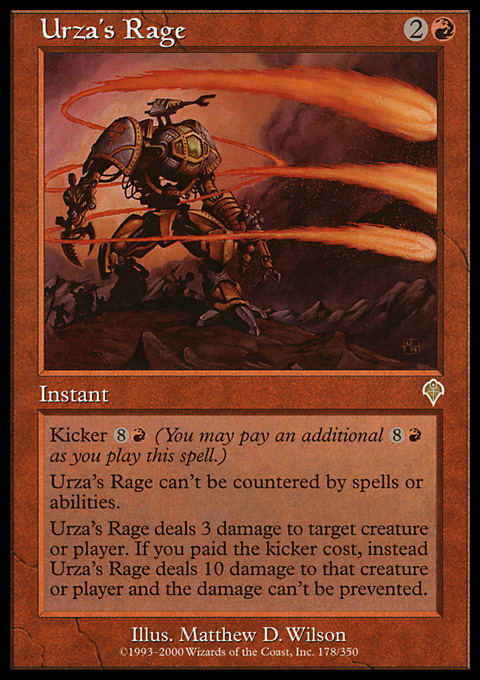I realize this isn't exactly breaking news. Losing is so painful and so antithetical to our culture that it often is disregarded and overlooked in our obsession with its opposite number: Winning!
Magic embraces this aspect of our culture. While draws are possible, it's generally a black-and-white game of winning and losing. As with the rest of our society, winning is glorified, and losing is generally ignored—and sometimes even vilified.
The fact of the matter is that no Magic player wins every match (though a quick glance at Jon Finkel's career might suggest otherwise), and no one ever became a Magic champion without learning from losses and learning how to deal with losing. Don't misunderstand me; I'm not saying that if you lose a bunch of matches that you should assume that you're well on your way to winning a Pro Tour. You might just be awful. I'm saying that champions have to deal with losing, too. How you handle losing and how you respond and react to it will go a long way toward determining your ability to succeed as a Magic player down the road.
No matter how good at Magic you are, you will lose matches, so why not learn to gain as much value from them as possible? The other reason to analyze your losses more is that losing ends up defining who you are as a person as much or more than your wins. Obviously, you won't become a champion or Magic celebrity because of your losses, but they will go a long way toward how others view you and to whom you become.
There are multiple people I know well whom I dislike and whom I avoid being around primarily because they've turned out to be atrocious losers who shame themselves with their behavior when they experience a painful loss. Whether it's revolting behavior toward their opponent or being completely obnoxious to friends, teammates, and/or bystanders, they seem to forget that they have an obligation as a Magic player to handle losing with a certain modicum of grace, especially if they want to start winning more.
There are two primary aspects to your losses: emotional and practical. While they are both very important, how much each aspect matters relative to the other depends a lot on your internal makeup. While I pride myself on emotional control, I’m also self-aware enough to know that the emotional aspects of competition are a critical part of who I am as a competitor and as a person.
In high school, I played for my school’s basketball team, primarily because at 6’4”, I was among the tallest players in our small rural conference, not because of any particular aptitude for the game on my part. We had a fiery young coach recently brought in to shake things up after completing a college basketball career. Winning or losing, at every halftime, our coach was swearing up a storm and getting in players’ faces, calling them out and demanding greater effort. Just sitting in the locker room watching him scream at my teammates was somewhat traumatic for me; I couldn’t imagine how I would be able to cope if he ever directed his vitriol in my direction. While I worked hard whenever I made it into the game from the bench, I knew that I was among the weaker links, and while relieved, I was actually a bit surprised to consistently avoid being targeted by his rage.
At the end of my final season, I even worked up the courage to ask Coach about this. I was curious—it seemed to me that I was the only player who was successful in avoiding having my face screamed in. Coach smiled and said, “You have to know your players; some players need a kick in the ass, and some players need a pat on the ass.” While I wasn’t sure this was a compliment, I did think that Coach had done a good job of understanding my emotional makeup.
After I became a fixture on the Magic Pro Tour, I was teammates with Pro Tour Hall of Famer Dave Humpherys. Whenever I was preparing for a crucial match, he would give me words of encouragement to pump me up. When I tried to do the same for him, he explained to me that while he understood words of emotional encouragement were the correct way to prep me for a big match, he preferred just to hear strategy advice related to his upcoming match and that emotional encouragement was an unnecessary distraction for him.
So yeah, I'm emotional. I cried at the end of Jim Carrey's The Grinch that Stole Christmas. With my emotional makeup, I'm lucky I ever played another game of Magic after my first loss. Yet, competitive gaming is my passion. When I am invited to play a roleplaying game, I explain that I prefer games with clearly defined winners and losers.
Let's face it: Winning wouldn't feel so good if losing didn't feel so bad. To survive competitive Magic emotionally, it's important to be able to handle losing and to have more than one definition of winning. In a Pro Tour with four hundred players, what's the most painful? Finishing second? Ninth? Sixty-fifth? Last? Much of it comes down to your expectations.
If you go to your first Pro Tour and don’t expect to win a match, making Day 2 is a major win to be celebrated. There is a special emotional beauty to actually winning the whole thing, though. The emotional peaks of my career were winning an Invitational, winning a team Pro Tour, and winning an individual Grand Prix. There was just something so special about finishing ahead of the best players in the world and it not being possible for me to have done any better. Yet, I’ve been playing in Pro Tours for over fifteen years, and obviously in most events, I’m not the one holding the trophy at the end. Why aren’t I a blubbering mass of emotion unable to draw another card?
In large part: Because it's worth it. The feeling of winning is worth chasing. Playing a match with thousands of dollars on the line is an incredible high. Winning that match is a rush that's hard to adequately describe with mere words. If I couldn't handle losing, I wouldn't ever get to win. No matter how good you are, you can never assume you're going to win any given tournament. Some of the finest players in Magic history spent years playing in Pro Tour Qualifiers before qualifying for their first Pro Tours. Losing any given match or failing to win any given tournament doesn't mean your dream of being a Pro Tour Hall of Famer has to be dead.
Rada Rudyak isn't exactly ready to give me a medal for my ability to lose serenely. She explains to me that it's easier for me because of my past accomplishments. Both I and others don't need to question whether a loss means that I'm not actually that good—my Magic résumé speaks so convincingly to the contrary. Since she has yet to qualify for a PT, she argues that when she loses a match, others might think it's because she's not actually any good at Magic, and she is also more likely to doubt herself for the same reason. I think there is a bit of a chicken-versus-egg conundrum in this case. I believe my ability to handle losing is among the reasons I was able to become a champion. In Rada's case, there is also some chicken-versus-egg. As she wins increasingly often and becomes better at handling her losses, which one (if either) is leading to the other?
Understanding your own emotional makeup and being able to handle losing emotionally is only half the battle, though. The other, often bigger, question is: Are you able to make practical use of your losses? Do you learn from your losses? Do they help fuel your passion for winning and help motivate you to work even harder to become a champion?
If you ask a serious Magic player how he's doing while he's in the midst of playing in a big tournament, his answer will typically be defined by whether he won or lost his last match. Someone who's 3–2 and just lost will often be despondent, while someone who's 3–2 and just won will often be almost jubilant. When you lose a tournament match, you can barely wait for the next round to start so you can cleanse your mental palate of that losing feeling with a win.
Losing requires two types of memory. If you’re mid-tournament and you just lost a match, you need to forget. Forget that your deck is capable of losing; forget that you’re capable of losing. Mid-tournament is no time for lack of confidence, second guessing, or distractions. Focus on the match at hand and what you need to do to win. You must not carry with you baggage from a loss.
Once the tournament is over, it’s time to remember the losses. Remember the pain, remember what went wrong, and remember why you lost. The pain of a loss should help push you to work harder for winning. In addition, you need to analyze your losses so you can determine what went wrong. Did you make a play error? Is your deck built incorrectly? Did you sideboard incorrectly? Does your sideboard need an overhaul? Was it a random, bad matchup against a freakishly rogue deck that you’ll never see again? Did you prepare for the wrong metagame? Should you scrap your deck in favor of a new one, or do you just need to become better at playing the current one and perhaps make a few changes to your deck and/or sideboard?
One of my favorite sayings is, “Hope for the best and prepare for the worst.” In Magic, you need to strive for the best (winning) but realize you can't always avoid the worst (losing) and that you need to be prepared for it. You should plan on winning. You should do the things needed to help ensure winning. You need to focus yourself mentally, emotionally, and practically for winning.
When sometimes you do lose, however—and you will lose sometimes—you need to be able to handle it and grow from it. When someone defeats me and he's pleasant and cheerful toward me, I appreciate it, but I don't give him any special credit for it. While I've seen bad winners (a special kind of shame), I'm thankful that it's pretty rare, and almost anyone can be a gracious winner. I save a greater portion of my respect for those players who lose with grace and then are able to leave that loss behind and move forward into the win column. A tip of my Magic cap to you if this sounds like a description of you, and if it's not, ask yourself why not and what can you do about it. Use your losses; don't let them use you.





























